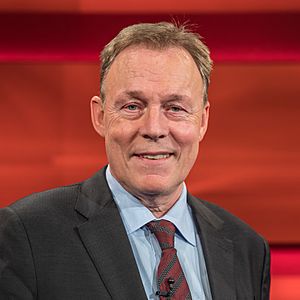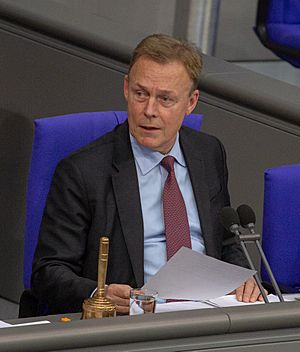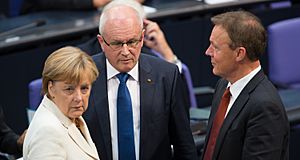Thomas Oppermann facts for kids
Quick facts for kids
Thomas Oppermann
|
|
|---|---|

Oppermann in 2020
|
|
| Vice President of the Bundestag (on proposal of the SPD-group) |
|
| In office 24 October 2017 – 25 October 2020 |
|
| Preceded by | Edelgard Bulmahn |
| Succeeded by | Dagmar Ziegler |
| Leader of the Social Democratic Party in the Bundestag | |
| In office 16 December 2013 – 27 September 2017 |
|
| Chief Whip | Christine Lambrecht |
| Preceded by | Frank-Walter Steinmeier |
| Succeeded by | Andrea Nahles |
| Chief Whip of the Social Democratic Party in the Bundestag | |
| In office 21 November 2007 – 16 December 2013 |
|
| Leader | Peter Struck Frank-Walter Steinmeier |
| Preceded by | Olaf Scholz |
| Succeeded by | Christine Lambrecht |
| Member of the Bundestag for Göttingen |
|
| In office 18 September 2005 – 25 October 2020 |
|
| Preceded by | Inge Wettig-Danielmeier |
| Succeeded by | vacant |
| Personal details | |
| Born |
Thomas Ludwig Albert Oppermann
27 April 1954 Freckenhorst, West Germany |
| Died | 25 October 2020 (aged 66) Göttingen. Lower Saxony, Germany |
| Political party | Social Democratic Party |
| Alma mater | University of Tübingen University of Göttingen |
Thomas Ludwig Albert Oppermann (born April 27, 1954 – died October 25, 2020) was a German politician. He was a member of the Social Democratic Party (SPD). From 2017 until his death, he served as the Vice President of the Bundestag, which is Germany's parliament. Before that, he was a leader of the SPD group in the Bundestag.
Contents
Who Was Thomas Oppermann?
Thomas Oppermann was an important figure in German politics. He was known for being part of the "Seeheim Circle," a group within the SPD party. This group often had more traditional or moderate views.
Early Life and Education
Thomas Oppermann was born in Freckenhorst, Germany, on April 27, 1954. He finished high school at the Goetheschule in Einbeck. After that, he studied German and English at the University of Tübingen.
From 1976 to 1978, he worked in the United States for a group called Action Reconciliation Service for Peace. This group works to promote understanding and peace. When he returned to Germany, he studied law at the University of Göttingen. He finished his law studies in 1986.
After law school, Oppermann worked as a judge. He served in courts in Hanover and Braunschweig until 1990. He also worked as a chief legal officer for the city of Hann. Münden for a short time. Thomas Oppermann had four children.
Starting His Political Journey
Oppermann joined the Social Democratic Party (SPD) in 1980. He quickly became active in local politics. Since 1989, he was the head of the SPD in the Göttingen region.
From 1990 to 2005, he was a member of the Lower Saxon Landtag. This is the state parliament for Lower Saxony. There, he was the spokesperson for legal matters from 1990 to 1998.
Between 1998 and 2003, Oppermann served as the State Minister for Science and Culture. He worked in the governments led by different Minister-Presidents, including Gerhard Schröder. In 1999, he tried to become the next Minister-President but did not win the party vote. From 2003 to 2005, he focused on economic issues for his party in the state parliament.
Working in the German Parliament
Thomas Oppermann became a member of the Bundestag (Germany's national parliament) in 2005. He served there until his death in 2020. In parliament, he continued to be part of the Seeheim Circle.
From 2006 to 2007, he led a group that looked into Germany's secret services. In November 2007, he was chosen as the First Parliamentary Secretary for the SPD group. This is an important role that helps manage the party's work in parliament. He was re-elected to this role several times.
As First Parliamentary Secretary, he also joined the Council of Elders. This group helps decide what laws the parliament will discuss each day. He also joined the Parliamentary Oversight Panel. This panel checks on Germany's intelligence services.
From 2006 to 2013, Oppermann was a deputy leader of the German-Israeli Parliamentary Friendship Group. This group works to build good relationships between Germany and Israel. He also helped choose judges for Germany's highest courts.
Leading the SPD Group
Before the 2009 elections, Frank-Walter Steinmeier, who was then the foreign minister, included Oppermann in his "shadow cabinet." This meant Oppermann was being considered for a top government job if the SPD won. He was the shadow minister for interior affairs.
In 2013, after the federal elections, Oppermann helped the SPD form a "Grand Coalition" government. This is when two of the biggest parties work together. When Frank-Walter Steinmeier became foreign minister again, Oppermann was chosen to lead the SPD group in the Bundestag. He took on this important role on December 16, 2013.
He also served on a committee that appoints judges to the Federal Constitutional Court of Germany. This court makes sure laws follow the German constitution. In 2015, he helped create the SPD's plan for the 2017 elections. He focused on defense policy during the campaign.
Becoming Vice-President
After the 2017 elections, the SPD had a difficult result. A new leader, Andrea Nahles, took over as head of the SPD group in parliament. Thomas Oppermann then became the Vice-President of the German Bundestag.
In this role, he helped lead the parliament's meetings. He also served on the Committee on Foreign Affairs. From 2019, he was part of the German delegation to the Franco-German Parliamentary Assembly. This group works to strengthen ties between Germany and France.
In August 2020, Oppermann announced that he would not run for re-election in 2021. He planned to leave politics at the end of his term.
Important Ideas and Beliefs
Thomas Oppermann had strong views on many topics. In 2011, he supported the idea of a national vote on important rules for the European Union.
In 2013, he spoke out against the government's plan to sell weapons to Saudi Arabia. He said it would greatly increase that country's military power.
When many migrants arrived in Germany in 2015, Oppermann said his party would not agree to create "transit zones" at the border. These zones would quickly send asylum seekers back home if they had no chance of staying.
Other Activities
Besides his political work, Thomas Oppermann was involved in many other organizations:
- He was the head of the Ethic Commission for the German Football Association (DFB) since 2019.
- He was a member of the Board of Trustees for the Hertie School of Governance.
- He was also involved with the Friedrich Ebert Foundation (FES).
- He supported the Center for Palliative Care at the University of Göttingen.
- He was part of the supervisory board for the Göttingen International Handel Festival.
- He served on the Board of Trustees for several Max Planck Institutes.
- He was a member of the Board of Trustees for the Volkswagen Foundation.
- He was also on the Television Board for ZDF, a German TV channel.
His Passing
Thomas Oppermann passed away on October 25, 2020, at the age of 66. He collapsed while waiting for a TV appearance and was taken to a hospital in Göttingen, where he died.
See also
 In Spanish: Thomas Oppermann para niños
In Spanish: Thomas Oppermann para niños
 | Toni Morrison |
 | Barack Obama |
 | Martin Luther King Jr. |
 | Ralph Bunche |



